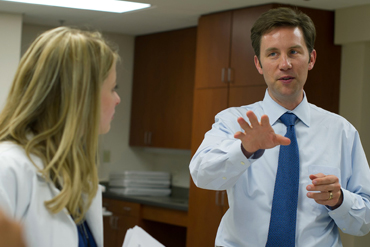While recovering from recent surgery, the man lying in the hospital bed took a sudden turn for the worse. His vitals were crashing and he began coding. His health care team sprang into action.

A team leader assessed the situation, accessed the patient’s chart and read aloud background information. She began to advise her team — another physician and three nurses — what needed to happen next. They mobilized and swiftly followed her lead, calling out medication doses and what they were doing as they were doing it. The efforts paid off, as the man — actually, a fully wireless, portable patient simulator that closely mimics the anatomical workings of the human body — started to stabilize.
The teammates, fourth-year students from the VCU schools of Medicine and Nursing, had just wrapped the fourth scenario in a series of eight simulator-driven situations that were part of an interprofessional education course, a new addition now being included in the curriculum of VCU’s health sciences schools.
After each scenario, the team had an opportunity to discuss their actions with each other and a faculty member who observed their interactions. With each subsequent scenario, there was marked improvement in communication and greater structure to how they performed their tasks and care for the patient.
VCU is among the leaders in interprofessional education, a growing trend used in the training of future generations of health care professionals. With little or limited opportunities to work together while still in school, many of these students would only have their first interaction with other health care disciplines on the first day on the job — with real patients.
Interprofessional education is designed to get multiple health care professions working as a team and communicating effectively. Many people may not realize that it takes the expertise of many different disciplines — physicians, nurses, pharmacists, therpaists, technicians and more — to come together and care for a single patient. Each one of these experts needs to be on the same page and in agreement.
“What we are trying to do is take the idea of working together as a team and bring it back into the classroom.”
– Alan Dow, M.D., M.S.H.A.
“Traditionally, with health care education, we’ve trained individual disciplines separately and expected them to come together as a team once they are taking care of patients,” said Alan Dow, M.D., M.S.H.A., assistant vice president of VCU Health Sciences and director of the Center for Interprofessional Education and Collaborative Care. “What we are trying to do is take the idea of working together as a team and bring it back into the classroom, into the safe areas like simulation where we can teach people how to work together as a team.”
Dow, a 2011 Macy Faculty Scholar, leads a research project through support from the Josiah Macy Jr. Foundation to examine how increased collaboration among health professionals can improve patient care and how to teach team-based competencies that foster effective interprofessional practice. His team, including more than 20 faculty members from six of VCU’s schools, is in the process of creating a sequence of interprofessional experiences that other institutions can use.
“At VCU, we’ve done small forms of interprofessional education projects for many years, but this is the first time we’ve really committed as a campus to doing large-scale interprofessional education where we’re bringing together whole classes of learners to do various activities such as patient simulation or managing virtual patients,” Dow said. “We want to train collaborative practitioners who can improve health and beneficially impact our communities.”
Photos by Charlie Archambault/Charlie Archambault Photography